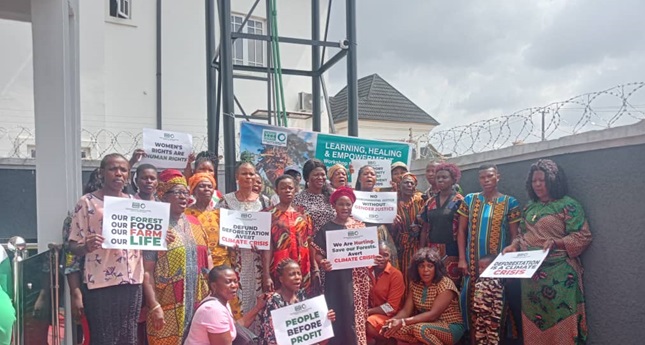An environmental rights group, the Environmental Rights Action/Friends of the Earth Nigeria (ERA/FoEN), on Wednesday trained women rural dwellers in Edo State who are affected by deforestation and industrial plantation expansion, on alternative sources of livelihood.
The one-day workshop for women drawn from such affected communities across the state were trained snail farming, mushroom cultivation, and soap making, with the potential to grow into a thriving local economy powered by women.
The workshop, with the theme: “Promoting Solidarity Economy. Building Resilience”, attracted women from no fewer than 15 communities spread across six local government areas of Edo State.
Speaking during the workshop, the Interim Administrator, ERA/FoEN, Rita Uwaka, lamented that women in the rural areas were mostly affected by deforestation as their farmlands were taken away.
Uwaka said that the workshop was aimed at empowering such women through a structured learning and healing programme that would equip them with information on environmental issues, their rights, and their struggles with support for alternative livelihood options.
She reiterated that the impact of deforestation and industrial plantation expansion in the Niger Delta region had impacted every aspect of life, adding that it had become imperative to train and empower the women on alternative sources of livelihood.
According to her, “Women in these communities are particularly vulnerable, facing violence, disruptions to their livelihoods, health hazards, displacement, and increased gender inequalities.
“This workshop addresses these challenges by providing a supportive learning, healing, and empowerment environment.
“The once lush forests that provided for us are disappearing, taking with them resources that have sustained us for generations.
“We face challenges in providing for our families, accessing clean water, and in holding onto traditions that are rooted in the land. These are not just environmental losses; they are also social and economic ones.” Uwaka said.
She expressed her organisation’s commitment to building a solidarity economy where every impacted community woman had skills, resources, and a support network that valued her contributions and ensured her sustainability.
According to Uwaka, the one-day workshop was not just to train the women but also to “provide a safe space for emotional healing, resilience building, and a collective solidarity economy for women impacted by deforestation and land grabs for industrial plantation expansion in Edo State.”
The ERA/FoEN Interim Administrator, while assuring the women that they would not be left alone after the training, disclosed that “a modest grant will be given to all impacted women by Environmental Rights Action.”
Uwaka, while advocating for women and the environment’s rights, displayed sub-theme messages such as:”Women’s rights are human rights; “Plant Actions are not Forests”; “People Before Profit”; “We are Hurting”; “Save Our Forests”, and “Avert Climate Crisis.”
Giving testimony on how her community had been impacted and suffered, Deborah Omoruyi of Ora community said: “Multinational took over our farm, now we don’t have land to farm. We go to other communities to rent land as high as N70,000.00 to farm. And once you delay in renewing your rent, they threaten you with quit notice.”
Osaremen Jimoh, from Odiguetue community also lamented that due to deforestation and industrial plantation expansion, women in her community had no land to farm, adding that land remained their major source of livelihood.
The trainees thanked ERA/FoEN for giving them the opportunity to acquire skills for alternative source of livelihood.
READ ALSO FROM NIGERIAN TRIBUNE
WATCH TOP VIDEOS FROM NIGERIAN TRIBUNE TV
- Let’s Talk About SELF-AWARENESS
- Is Your Confidence Mistaken for Pride? Let’s talk about it
- Is Etiquette About Perfection…Or Just Not Being Rude?
- Top Psychologist Reveal 3 Signs You’re Struggling With Imposter Syndrome
- Do You Pick Up Work-Related Calls at Midnight or Never? Let’s Talk About Boundaries







